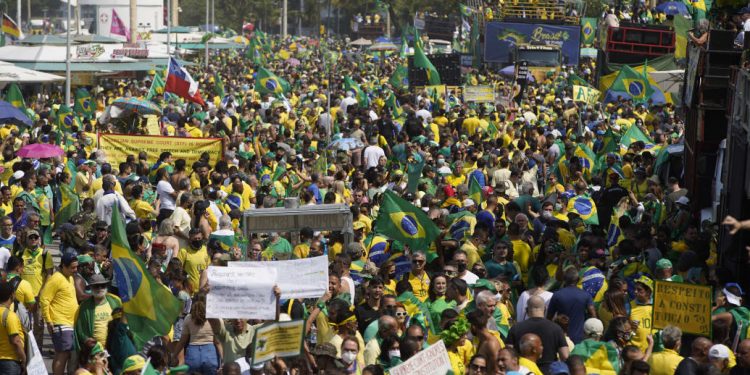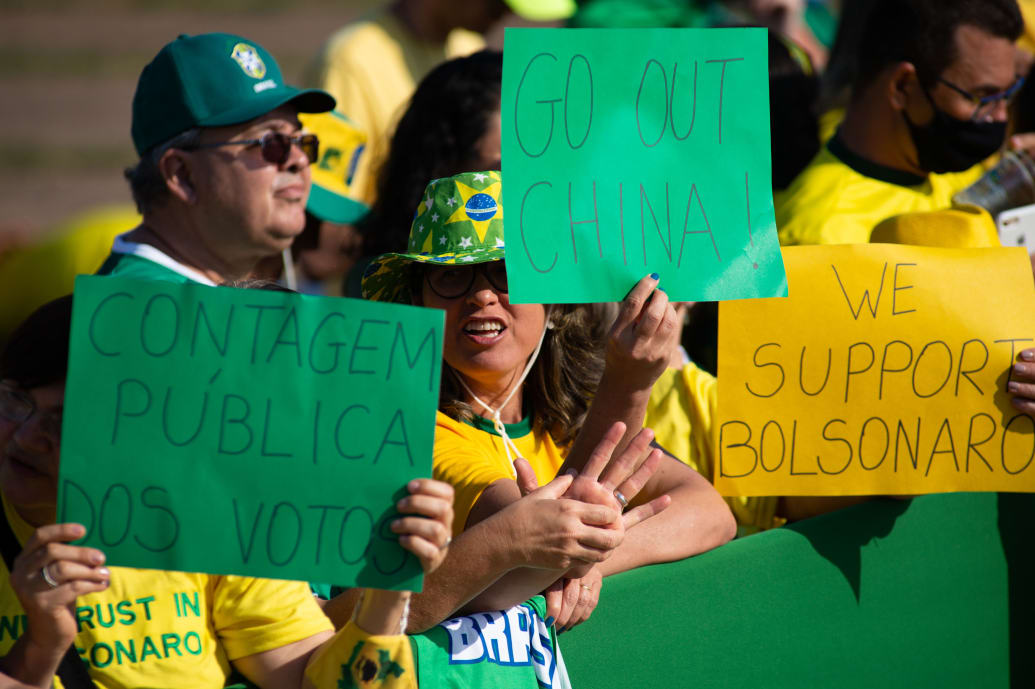RIO DE JANEIRO—Supporters of President Jair Bolsonaro answered the far-right leader’s rallying cry on Tuesday and took to the streets in cities across Brazil, stoking fears of violence at the hands of his most radical fans and sowing uncertainty over the country’s democratic health.
Hundreds of thousands of Brazilians poured into the streets of major cities across the country, clad in the yellow-and-green soccer jerseys that have become a symbol of the Brazilian far-right. Some draped massive Brazilian flags over their shoulders or wore face masks stamped with the colors.
Bolsonaro appeared at the protests in Brasilia and São Paulo, amid cheers and applause, firing up his fans with a tirade against his enemies. “I want to say to those who want to make me ineligible in Brasília: only God can get me out of there,” he told the crowd of supporters in São Paulo. “Warning to the scoundrels: I will not be arrested.”
In Rio de Janeiro, the president’s supporters spilled into the city’s iconic ocean-front promenade, singing and chanting the president’s name. Some waved signs demanding the dismantling of the Supreme Court and a return to paper ballots—echoing Bolsonaro’s bitter attacks on democratic institutions.
“We are here supporting our president but we are also here supporting our democracy,” said Kátia Menezes, a retired government worker who came out in support of Bolsonaro, clad in a soccer jersey printed with the word “Brazil” on the back. “We are here fighting for our democracy, for our institutions which are being corrupted.”
“Gut the whole Supreme Court—none of them are worth anything,” said Maria da Silva, a shop worker who came to the protest unmasked but clad in yellow-and-green from head to toe. “Our president needs to govern and they won’t let him.”
Protesters also took jabs at the leftist Workers’ Party and former President Luiz Inácio Lula da Silva, commonly known as Lula, who served two terms in office but remains a deeply polarizing figure in Brazilian politics. “Lula, you thief, your place is in jail!” the crowd chanted.
“We are tired of the corruption,” said da Silva. “We want freedom in our country, we are fighting for our country. The thief that was in power before, we don’t want him again!”
Lula is leading the polls ahead of next year’s presidential election, after a court scrapped a corruption conviction against him and restored his eligibility to run for another term. Some 47 percent of Brazilians say they would vote for Lula in the first round of elections, while 34 percent say they would cast a ballot for Bolsonaro.
But Menezes doesn’t buy it. “Look at all these people here—but they claim Lula is leading in the polls. Yeah right!”
The protests were seen by observers as an attempted show of strength by Bolsonaro, as his popularity plunges ahead of next year’s elections. His approval ratings have hit new lows, battered by his catastrophic handling of the COVID-19 pandemic and a deepening economic crisis that has angered many Brazilians.
“It’s an extremely serious threat. What’s at stake is the democracy of the country.”
Weakened, Bolsonaro has responded by attacking Brazil’s institutions and casting the Supreme Court as an enemy. He has also tried to discredit Brazil’s electronic voting machines ahead of next year’s elections, falsely alleging fraud and demanding a return to paper ballots.
Eager to beat back allegations of waning popular support, Bolsonaro has fought to mobilize and radicalize his base, with a demonstration marking Brazil’s Independence Day. Buses full of demonstrators flooded large cities ahead of Tuesday’s protests. In São Paulo, some 114,000 of his supporters took over the city’s main avenue, according to police estimates. In the capital, Brasília, the protests drew an estimated 400,000 people.
The large-scale gathering unnerved many observers, who feared the demonstration could descend into chaos reminiscent of the Capitol Hill invasion in the United States. Demonstrations in most cities remained peaceful, although protesters in Brasilia tried to breach security barriers and advance towards Congress, clashing with police hours before the protests kicked off.
The turnout sends a worrying signal that, despite his declining popularity, the president is still able to rally up his core support base, according to Sérgio Praça, a political scientist at the Fundação Getulio Vargas, a think-tank.
“What we see from these protests is that Bolsonaro is still able to mobilize a smaller, highly-engaged base, and fire them up even more,” he told The Daily Beast. “It’s an extremely serious threat. What’s at stake is the democracy of the country.”
Bolsonaro, a former army captain, has also unnerved many with recent attempts to court the military and ensure their loyalty. This has fuelled concerns that the president may be laying the groundwork for a coup if he is not re-elected next year.
The far-right leader has appointed more than 6,000 former and current military officers to top government jobs—more than double the number that served under his conservative predecessor, Michel Temer.
In Rio, some in the crowd wore camouflage print and a group of military officers waved Brazilian flags. A small military jeep snaked through the crowd, honking in support of the president.
“It’s really important that we come out to show our support right now, to reconquer our freedom,” said Josué do Santos Silva, a military officer who wore a Brazilian flag draped over his shoulders as he stood at the edge of the demonstration. “The criticisms of our president are totally illegitimate.”
Last month, military tanks paraded in front of Congress and the Supreme Court, just hours before lawmakers voted on Bolsonaro’s proposal to bring back paper ballots. The move was criticised and ridiculed at home and abroad— but the parade was a win for Santos Silva. “I thought it was wonderful,” he said.
Bolsonaro’s more radical fans also made an appearance at Tuesday’s protests. A handful in the crowd wore shirts emblazoned with machine guns and the symbol “AI-5”—a nod to a brutal decree passed by the military dictatorship that governed Brazil from 1964 to 1985, which paved the way for widespread torture.
Praça says the demonstrations create uncertainty over the country’s democratic health which is likely to last until the elections next year. Bolsonaro’s discourse, meanwhile, has succeeded in sowing doubts about Brazil’s institutions, leaving the country’s democracy more fragile.
“I think what Bolsonaro wants,and he is succeeding at,is to put the country in a deep state of distrust and tension,” he said. “And we are unlikely to emerge from this state until the elections, which are more than a year away.”
Source by www.thedailybeast.com















































